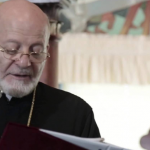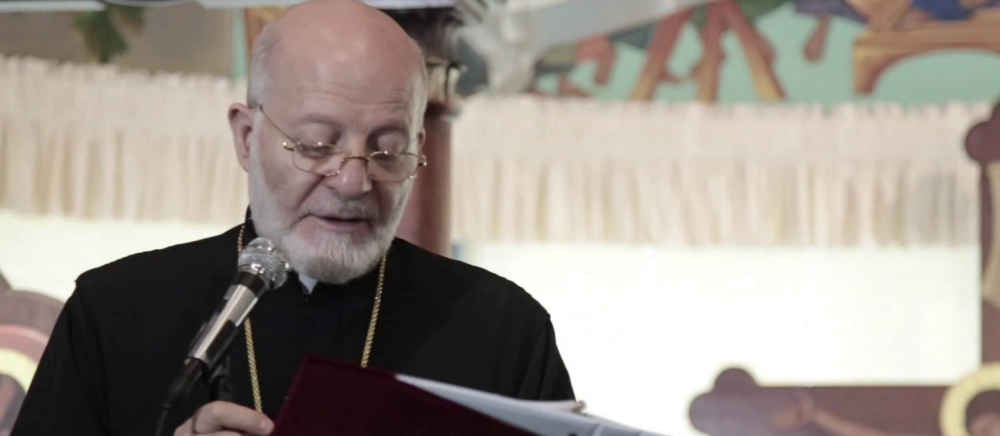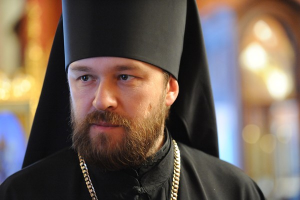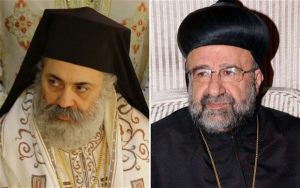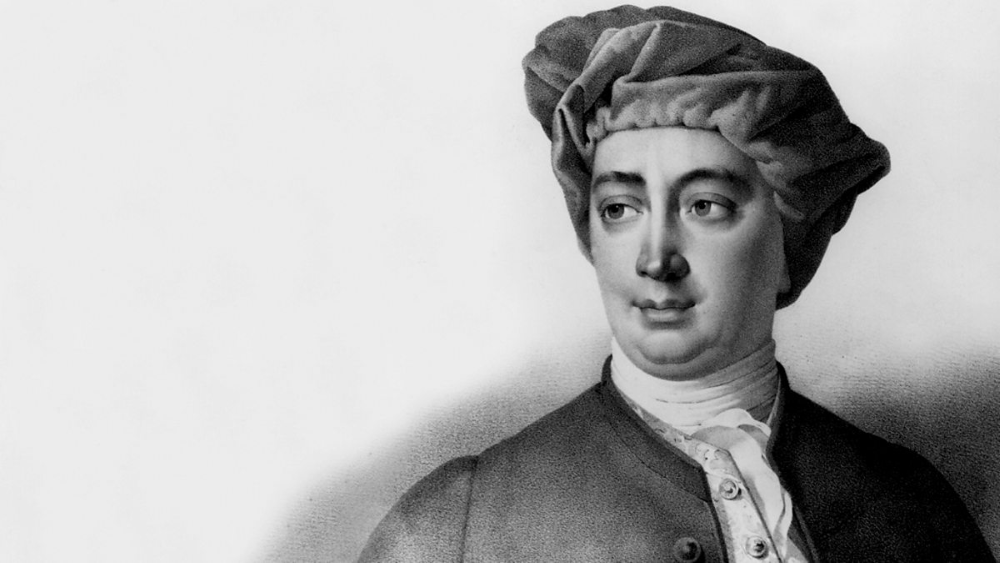
The following responds to the recent Atlantic Monthly article How an 18th-Century Philosopher Helped Solve My Midlife Crisis: David Hume, the Buddha, and a search for the Eastern roots of the Western Enlightenment by Alison Gopnik who suffered a deep crisis of purpose and meaning and reached out to the writings of philospher David Hume for help. After considerable searching she writes, “I had found my salvation in the sheer endless curiosity of the human mind—and the sheer endless variety of human experience.”
Not so fast writes Fr. Patrick Irish below. The skeptic here simply refuses to apply her skepticism without any intellectual rigor or honesty. She merely rejects a hard atheism for a softer one. I’ll let Fr. Irish explain it in his own words:
Gopnik, and by extension every post-Russell skeptic has done (logically), is an attempt to shift away human consideration of any unprovable It (God, Self, a Purple Dragon or Russell’s Teapot) to an unexamined acceptance of unprovable metaphysical notions like numina. She sets forth an irrational analogical propaganda of human skepticism versus Aristotelian metaphysics, one that she does not test, honestly as a skeptic.
“…But here’s Hume’s really great idea: Ultimately, the metaphysical foundations don’t matter. Experience is enough all by itself. What do you lose when you give up God or “reality” or even “I”? The moon is still just as bright; you can still predict that a falling glass will break, and you can still act to catch it; you can still feel compassion for the suffering of others. Science and work and morality remain intact. Go back to your backgammon game after your skeptical crisis, Hume wrote, and it will be exactly the same game.
In fact, if you let yourself think this way, your life might actually get better. Give up the prospect of life after death, and you will finally really appreciate life before it. Give up metaphysics, and you can concentrate on physics. Give up the idea of your precious, unique, irreplaceable self, and you might actually be more sympathetic to other people.
[M]ost of all, like Hume himself, I had found my salvation in the sheer endless curiosity of the human mind—and the sheer endless variety of human experience.”
— Alison Gopnik, How an 18th-Century Philosopher Helped Solve My Midlife Crisis
In the Beginning
“Bill, you’re an intelligent man. You know the score. You don’t believe in this God crap, right?”
My late Uncle Bill had a response to this silliness. It was rather rude and pithy.
“Of course I believe in God. What’s to stop me from killing you where you sit?”
Before he had seen action on Guadalcanal, where he picked up some shrapnel in his left ear, he saw the Marines whose planes he patched up, roasted alive in the pitched battles of the Pacific Theatre. Suffering through all that horror, he still believed as strongly as he sinned. Sitting in Duggan’s on 6th Street, listening to some yammering atheist was too much for a man who, at the end of a long day installing Coca Cola vending machines, just wanted a beer; and, maybe, to get lucky.
Bill wasn’t above any of the prejudices of his generation, but neither was he ignorant, nor did he abide sloppy thinking.
I think, had he the patience for it, he could have responded less bluntly, yet as clearly.
I Gotta Be Me…
It takes a unique, precious, irreplaceable, compassionate self to consider that another is as or more valuable than one’s own self, and act accordingly. Any altruistic consideration of another is a very complex set of concepts. Any skeptic will aver, yea, dogmatically so, that all such concepts begin their slippery lives as sense impressions. Any real skeptic also recognizes that present sense impressions are but thoughts, as are a priori assumptions, memories of past sense perceptions, and all metaphysical foundations. All skeptics demand that whatever assertion is made concerning anything, if there are attributes that admit of physical measurement, that the assertion be proved, by physical, empirical tests. Logically, if physical tests cannot measure the attributes of anything asserted to exist, then that thing’s existence cannot be proved.
Many celebrated atheist apologists, today, are missionary-fervent in converting the masses of the “Western,” “post-Christian” milieu to their anti-God cause; one common tactic used during these staged expositions or encounters is their demand that believers use logic to prove, empirically the existence of God (or Carl Sagan’s Purple Dragon or Bertrand Russell’s Astronomical Teapot). Today’s skeptic and atheist wants the primary forms of logic to equate the absence of proof for God’s presence with disproof of God’s existence. The present-day atheist apologist jumps the gun, logically. The present soft atheism of the post-modern skeptic desires that his or her pet a priori assumptions be exempted from the same skeptical prohibition of metaphysical foundations. In doing so, today’s soft-core atheists and skeptics desire to be only as logical as one might, and remain as illogical and irrational as it suits them, no less than any theist, or religionist of any stripe.
Skepticism proves nothing. Skeptics, who dismiss God or metaphysical foundations still, absurdly, attempt to use a priori presentiments in logical forms to prove what they themselves demonstrate logic cannot prove. Were skeptics and atheists to be equitable, they should be as rigid with their own scheme of logic and empiricism when discussing knowledge, being, and self; they should do so, empirically and logically, and apply their logical conclusions, especially their own atheistic leap into an unfounded conclusion from an unproved end. Along with removing all metaphysical foundations from inclusion in the set of examinable bits of information, atheists must include, under the same rubric, all things whose existence is unprovable by a physical test: this includes all a priori assumptions or sense impressions or emotions. Having failed to prove their existence, let atheists and skeptics declare such things non-existent. Atheists and skeptics must refuse to use them in any argument or draw any conclusion from any input they purport to provide, because they are meaningless things for the purpose of any argument.
Dr. Gopnik’s article touting her skeptic’s assertion of a paradox of human experience standing in for metaphysical foundations: her examples are the products of mushy thinking; and they are polemic as they are dishonest. By stripping reason of metaphysical foundations or by avoiding the blunt admission that reason requires a priori realities in order to have sense impressions cognitively useful, modern skeptics and atheist apologists like Gopnik (in this article) intimate that skeptical empiricism creates from logic, morality, or desire. Logic does not create morality or provide desire: it cannot conclude if anything, anyone, or any condition demands an action to, for, or against, anyone. A priori assumptions are at the heart of Gopnik’s assertion that the object she sees in the night sky is the moon, let alone, still the same moon she saw previously, and not Russell’s teapot; only Gopnik’s a priori assumptions allow her to assert compassion divorced from a precious, irreplaceable self.
Likewise, Gopnik’s interest in Hume’s possible introduction to Buddhism at La Fléche, as well as her side-trip into the religious considerations of Buddhist non-being is confusing. It confuses me, that she finds Buddhism at all worthy of consideration, if but for the fundamental reality about Buddhism, and it’s raison d’ étre; namely the ontological relationship of Ahimsa, or right conduct, and the eternal punishment of reincarnation until the practitioner attains nirvana.
For all its insistence on the not-self, there is a lot of self-direction demanded of one who seeks to “take refuge in the Buddha.” There is a finely articulated level of skeptical inquiry that Buddhism demands its adherents undergo, as they take responsibility for sorting out for themselves what is good and worthy to follow, versus what is evil and to be resisted (in agreement with the Sutras). Voluntarily changing one’s behavior according to a restrictive instruction can occur, only, if someone does that action. Both the doer and the recipient of the action must actually exist; otherwise, one is asked to do what cannot be done. Logically, creating a state of non-self while living is the creation of the not-I (while living) which can only be suicide, or at best, psychosis. Buddhism demands, strongly, right conduct in this life so to pave the way for dissolution into non-being in the life after one’s present life as one’s reward for enlightenment (nirvana).
Gopnik’s reiteration of her piqued interest in Hume’s possible connection to a non-theistic religion confuses me, as she wrote that she is uncomfortable with anything that seems like salvation. Buddhism abhors suicide, requires mindfulness, prizes mental acuity, and demands responsibility for one’s mental state and one’s conduct. All of which require a knowledgeable, intuitive self that IS seeking salvation out of this life (which seems both a prison sentence served in general population and a required general education course) by dissolution into nirvana as a condition of an afterlife. That David Hume could have extrapolated that human nature is its own salvation by discussing Buddhism with Jesuit missionaries and brought forth a skeptic’s gospel is breathtaking…in an asthmatic sort of way. Marvelous are the ways of modern skepticism…go figure.
Gopnik’s article illogically affirms that there is an a priori self that makes choices to act on sense impressions. It is part of the human condition to be simultaneously illogical and ordered, irrational yet crave rationality, seek certainty from objects and people while refusing to act coherently with the evidence of one’s senses. For example, human babies and kittens differ in that grown cats will never learn about object constancy with reference to the self. Kittens and cats always react with surprise and anger to their reflections in a mirror. They don’t recognize the image as a reflection of themselves…and, they don’t need to. However, human babies that do not learn about object constancy with reference to the self, become adults in straightjackets, if they live that long. In order to learn about object constancy, one has come to trust that the thing one saw is the same thing one sees now. The fact that trust comes with belief is an unprovable, metaphysical foundation, one of many sets of a priori notions that humans use, constantly, albeit unconsciously.
I will repeat this simple request, that skeptics and atheist apologists be empirically and logically consistent: if one rejects all metaphysical underpinnings because they cannot be logically tested or empirically falsified, one must also agree to ignore all a priori assumptions or notions because of the same logical and empiric shortcomings. The real skeptic must empirically disregard conclusions drawn from any a priori set of assumptions about the good, the true, the beautiful, or the equitable and just; no matter how atheist, non-metaphysical, or “Newtonian” any a priori assumption seems, it too, must be rejected.
With that rejection, the processes of science and work do not change, because arithmetic, chemistry, and Newtonian physics are a closed system. This system relies on the unbending relationships between concepts of numbers that humans manipulate by immutable processes; they are concertedly, rigorously, dogmatically logical: if you don’t believe in zero or integers, arithmetic will kill you.
Dr. Gopnik errs, I think, fundamentally. Where one changes the ends to which scientific inquiry (or any work) is directed, one changes the rationale for following the a priori impulse of curiosity. As I have already demonstrated, the propositions of any hypothesis, or statement, are logically untestable if any unprovable a priori notion is the starting point by which the ends for any inquiry are directed. If the propositions of an inquiry are untestable, the proposition remains unprovable. Following the new skeptics and new atheists, if that untestable proposition is unprovable, whatever that proposition asserts must be non-existent, and therefore, disallowed consideration for any informative purpose. Ascertaining that informative purpose requires that the person doing the inquiry knows there is some reason sufficient for doing it, some reason beyond mere curiosity; as it stands, the truly skeptical end of Gopnik’s or any other atheist’s foray into curiosity has no meaning other than enumerating a bundle of memories of formerly-perceived sense impressions.
Gopnik’s in-passing reference to her recent research into the nature of self as a self-constructed collection of information about the self is another sloppy solipsism. For the reasons stated previously, the logical end of her research is that if the self were “self-constructed,” then there had to be something that makes the self, the self. Further, such a self must make decisions about the value of this or that fact or piece of information that someone, a self, used and might still use again. All the metaphysical foundations or a priori presentiments that one acts upon, thinking such are the product of a human self-construction must presume an active agent, a self that has learned to do things and has the capacity to do so in the future, in a self-directing manner.
I will, to my last cogent keystroke, repeatedly request of skeptic and atheist apologists, to stop faking the existence of any paradoxically innate a priori human value, as these are as empirically inapprehensible, and by extension, as empirically incomprehensible as any metaphysical foundation. As long as they keeping using a priori assumptions to any purpose, even to disprove the validity of metaphysical foundations, they are an embarrassment to real skeptics. The new atheists and skeptics need to remember: if sense perceptions are only thoughts, and thoughts that point to metaphysical notions are only thoughts, then all thoughts are thoughts that need to be treated empirically and skeptically in every act of cognition.
Skeptics and atheists wanting their empirical cake and eating it too, know that leaving aside all self-referent and a priori presentiments renders any cognitive activity meaningless; scientific inquiry or any work undertaken under those conditions is likewise void of meaning. Gopnik writes of her illogical desire that humans possess and act on an innate sense of compassion, somehow know what is true, good, beautiful, or fair and just because of the strength of human experience. This appeal to substitute human experience for metaphysical foundations requires employing, cognitively, a priori assumptions to create rationality or meaning from sense impressions. Her article’s thought experiment is an intellectual departure for any metaphysically skeptical thinker, for whom words like compassionate, good, or evil must, in any empirically complete sense, remain pretty yet meaningless adjectives or nouns: a priori assumptions are as empirically untestable as are metaphysical foundations or the existence of Astronomical Purple Teapots breathing immaterial phlogiston.
Compassion and altruism are concepts that are constructed according to a priori realities. While we learn how to express compassionate behavior, socially, we do not learn how to feel compassion, because compassion already exists in most human beings as a condition of one’s existence. Humans lacking an altruistic sensibility are sociopaths; although one can fake altruism by emulating compassionate behavior, there is no good end for such deceit for the object of that lie.
Unfortunately, for the skeptic, there is no room for logical dissimulation. The skeptic’s empirical requirement for logical consistency must remove all metaphysical foundations and all a priori presentiments and reactions out of cognition and behavior selection. Thus, the empirical processes of scientific inquiry cannot change. The inclusion of a priori or metaphysical foundations shapes the boundaries of a problem by creating a meaningful context for that problem; it’s the moral context of the problem that a particular scientific inquiry creates, that changes the thrust of the question. The question of whether or not I might do something remains; but the question as to whether or not I should do something disappears: should I do x, y, or z because of the ramifications of that action to some other worthy person or other object beyond myself? The very thought of restraint for the sake of another is an a priori assent to a metaphysical foundation that some other object or person is as worthy of protection as I am, myself.
No, cut loose the metaphysical foundations of things, from the things you perceive (even yourself or the moon), the very nature of science and work do, indeed, change even though the perceiver’s perceptions of those things seem the same as before. Claiming, as logical conclusions, that the varieties of human experience are all one needs, minus the intellectual honesty to refuse the presence of a priori conditions to explain the presence of those human conditions creates an absurd, and polemic non-sequitur. All Gopnik, and by extension every post-Russell skeptic has done (logically), is an attempt to shift away human consideration of any unprovable It (God, Self, a Purple Dragon or Russell’s Teapot) to an unexamined acceptance of unprovable metaphysical notions like numina. She sets forth an irrational analogical propaganda of human skepticism versus Aristotelian metaphysics, one that she does not test, honestly as a skeptic. She, who knows the primary forms of logic, should know better than to propagandize for the unprovable by substituting the untestable. The constant fact of human curiosity undergirds the a priori concept of someone expressing interest in something previously unknown to oneself. Human curiosity is not limitless, neither are the many kinds of human experience. All human experiences, skeptically speaking, end in death. After conception and birth, Death, is the event to which all human learning is pointed, the event by which all natural human experience ends.
Skepticism, where it’s honestly practiced, is nihilism.
In the end, what I find most disturbing of her article’s grand excursion, is the blithe manner with which Dr. Gopnik trumpets the intellectual dishonesty of stripping out God, Self, and Metaphysical Foundations without stripping out all other a priori notions concerning her wondrous curiosity as a Homo sapiens. Her article reveals the face of the new, “soft” atheism, which seems not to be above perpetrating its own version of the skeptical, secularly pious fraud.





